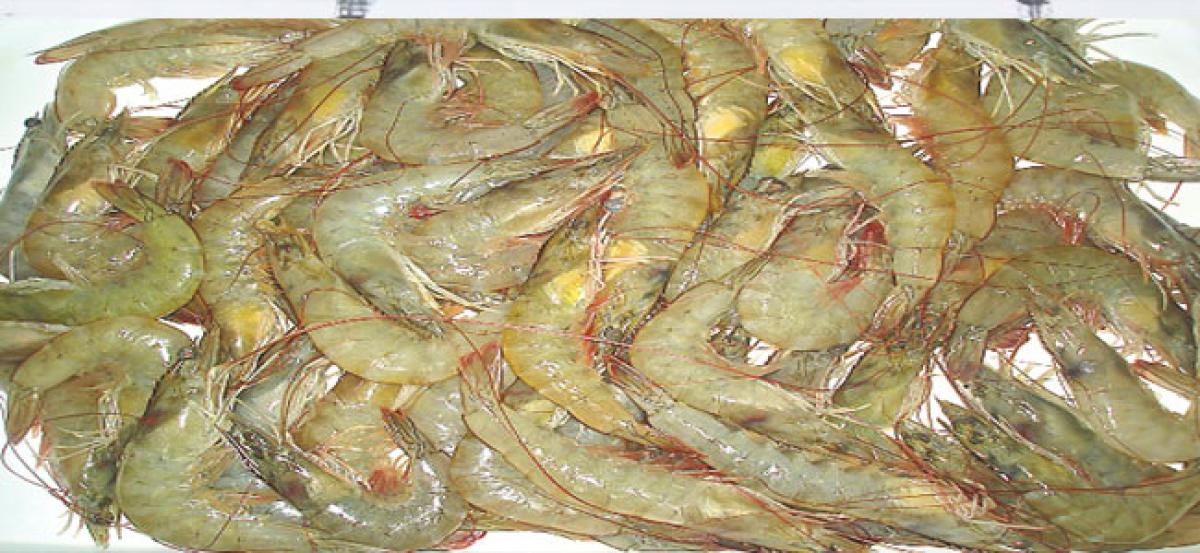Live
- Dhanush Sues Nayanthara Over Unauthorised Use of Film Clips in Netflix Documentary
- Silver Prices Hit One-Month Low in Hyderabad, Dropping to Rs 97,900 per Kg Since October
- Honoring mars and its mysteries
- Opposition leaders create ruckus in Bihar Assembly over Waqf Bill
- World Sindhi forum calls for ending violence against Bangladesh minorities
- PKL Season 11: First half vs Tamil Thalaivas shows our potential, says UP Yoddhas assistant coach
- Google connects Spotify to its AI assistant Gemini
- Speed up land acquisition for projects in Kerala, Railways Minister tells CM Vijayan
- Sensex ends in green, Adani Ports top gainer
- Indian Chemical Council bags 2024 OPCW-The Hague Award
Just In

European Union rejected 10 containers of shrimp from India during the last six months and US another 52 containers after the inspection agencies from both the continents found presence of banned antibiotic Surazolidone and chlorafenicol, veterinary antibiotics residue in Vannamei variety of shrimps.
Visakhapatnam: European Union rejected 10 containers of shrimp from India during the last six months and US another 52 containers after the inspection agencies from both the continents found presence of banned antibiotic Surazolidone and chlorafenicol, veterinary antibiotics residue in Vannamei variety of shrimps.
The exporters are worried now with these rejections and stepped up efforts to rectify setbacks and send quality products as the demand for shrimps is growing all over the world.
Highlights:
- Exporters suffer as EU rejects 10 containers during the last six months
- US rejects another 52 containers
- Blame put on seed merchants
- EU, Indian tests not matching, scientists point out
- Suggest conducting proficiency test before shrimps are exported as it will be uniform throughout the world
- However, seafood exporters predict boom in exports
- Last year, seafood worth Rs 37,870 cr was exported from the country
- This year the exports are expected to cross Rs 40,000 cr
- AP constitutes 50 per cent of total seafood exports in the country
India exported Rs 37,870 crore worth seafood during the last financial year, the highest in its history and expected to cross Rs 40,000 crore during the current fiscal, with half of the exports emanating from Andhra Pradesh.
The rejections began in 2008 when EU importers found banned antibiotics in Campi variety of shrimps. The same year they rejected 29 containers and 31 the following year.
The ban resumed in 2015 and 2016 when 10 containers were rejected. This year 10 containers were turned back from EU and 52 from US.
Unlike Medical Council of India and Veterinary Council, there is no statutory body to monitor the aquaculture which comes under the Ministry of Agriculture, said Dr B Madhusudana Rao, a scientist from Central Institute for Fisheries Technology, who along with scientists from Export Inspection Agency and Central Marine Fisheries Research Institute, visited some factories in East and West Godavari recently.
“The problem of veterinary medicinal drugs in shrimp is plaguing the Indian shrimp export. Residues of antibiotics in food are potentially harmful to the consumers. Chloramphenicol causes aplastic anaemia and nitrofurans are carcinogenic. EU has zero tolerance towards antibiotic residues and any confirmed concentration of any of the metabolites is a non-compliance,’’ Dr Rao added.
Dr Rao said the farmers of aqua ponds claimed that they never used any banned antibiotics but suspected the agents and lab technicians of seed companies. These agents in order to push their own products defend the quality of their seeds.
“There is also no data on the lab technicians operating in the country, who are not accountable to any government agency. These technicians need to be registered and their antecedents recorded by some government agency,’’ Dr Madhusudana Rao suggested.
He also added that there is no unanimity in the tests conducted by both India and European Union Agency. If the product is showing negative to the tests before shipment, the importers in EU are finding positive on landing and rejecting the consignment causing huge loss to the Indian exporters.
“We are suggesting proficiency test which will be uniform all over the world,’’ Dr Madhu added. When asked about the prospects of seafood exports from India, president of Seafood Exporters Association of India V Padmanabhan told The Hans India here on Monday that the rejection by EU and US was part of history.
“We are seeing bright prospects and making a leap. We will be exporting Rs 40,000 crore worth products with half being produced in Andhra Pradesh,’’ Padmanabhan said.
Visakhapatnam Port Trust tops in India: Vizag port exported 1,59,973 tonnes of marine cargo worth Rs 9,294.31 crore (1,401.94 million US dollars) in 2016-17, the highest in the country followed by Kochi (1,55,989 tonnes, Rs 4,447.05 crore), Kolkata (1,04668 tonnes, Rs 4,451.67 crore),
Pipavav (2,32,391 tonnes, Rs 4,217.45 crore), JNP (1,49,914 tonnes, Rs 4,084.96 crore), Krishnapatnam (62,049 tonnes, Rs 3,701.63 crore), Tuticorin (42,026 tonnes, Rs 2,220.52 crore), and Chennai (37,305 tonnes, 1,693.87 crore).

© 2024 Hyderabad Media House Limited/The Hans India. All rights reserved. Powered by hocalwire.com







